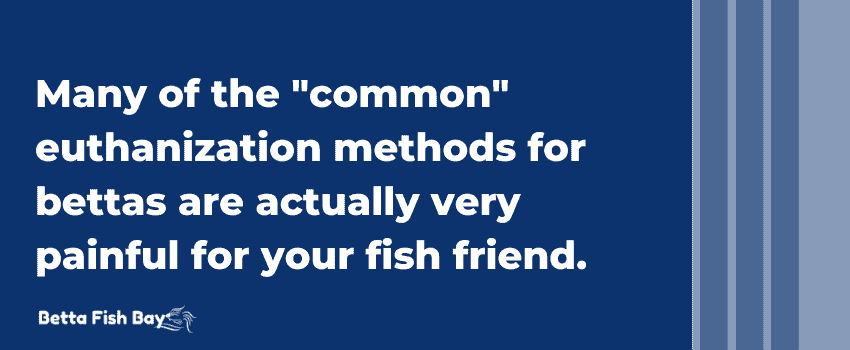Saying goodbye to your beloved pet betta fish is never easy. Most betta owners form deep bonds with their fish and see them as part of their family.
Many bettas pass away from old age. But others are not as lucky.
For betta fish with incurable diseases, their owners must make a difficult decision.
After exhausting all treatment options for your sick fish with no improvement, a humane death is the only solution.
Taking your betta to the veterinary clinic is the preferred method of humane euthanization. But the expense of the treatment is often a barrier for some betta owners.
In this article, we explain the humane method of euthanasia for your betta using essential clove oil.
We also discuss the factors you must consider before euthanizing your betta and euthanization methods to avoid.

Table of Contents
Why Humane Euthanization of Your Betta Is Important
No betta owner wants a painful death for their fish.
The essential clove oil method is the most humane way of euthanizing your betta at home.
Clove oil acts as a natural anesthetic for fish. A few drops of clove oil put your betta to sleep in a peaceful way.
Your betta does not feel pain with the clove oil, unlike other inhumane methods.
This is the most common method of euthanasia among fish keepers.
But you must take care when using the clove oil method of euthanasia.
Adding too much clove oil at once can make your betta panic. This creates a lot of stress for your betta in its final moments.
Your betta may struggle and not have a peaceful death.
Small amounts of clove oil added at set time intervals prevent this stress.
When used in the correct way, clove oil relieves your betta of pain and puts the fish to sleep before it stops breathing.
Factors To Consider Before Euthanizing Your Betta

Before you euthanize your betta, there are some important factors you must consider.
Euthanization is a last resort option after other treatments fail.
Never euthanize a healthy fish simply because of aggressive behavior or lack of space.
Instead, donate your healthy unwanted fish to a school or doctor’s office. Or, you may reach out to others interested in adopting your betta.
Consider the following factors before making such a big decision.
Does Your Betta Have a Fatal Disease?
Bettas can recover from a variety of common diseases with the correct treatment.
But some diseases do not have a cure and result in a fatal outcome.
Some fatal fish diseases in bettas include:
Fish Tuberculosis
Tuberculosis in bettas is very rare, but there is no cure. It is contagious to humans and other fish, as well.
Columnaris
Columnaris is a contagious bacterial disease with a high death rate. Antibiotics can treat the disease in its early stages but by the time symptoms appear, it is usually too late.
Dropsy
Dropsy, known as pineconing, is actually a symptom of other diseases. It is usually a death sentence and caused by more fatal diseases like tuberculosis or cancer.
Chronic Swim Bladder Disease
Causes of swim bladder disease include constipation, tumors, and genetic defects. Swim bladder disease caused by untreatable tumors or genetic defects becomes chronic and affects your betta’s quality of life.
Cancerous Tumor
Cancerous tumors are rare in bettas, but there is no treatment for them. These types of tumors make your betta very sick and affect its quality of life.
If you suspect your betta has an illness, do your due diligence and find the cause. Always be sure of your betta’s diagnosis before making any decisions about euthanasia.
Have You Exhausted Treatment Options for Your Betta?
Some betta fish diseases have more than one treatment option.
Understanding your betta’s illness and the underlying causes helps you determine the correct course of treatment.
Many fish owners turn to the internet for a diagnosis of their betta. While the internet can help you diagnose your betta, there is also a lot of misinformation.
This can lead to using the wrong medications for your betta. As a result, your betta never gets well and the condition may worsen.
If you are unsure about what is wrong with your pet fish, consult a veterinarian. A veterinarian can provide the correct diagnosis and prescription medications for your betta.
Some treatments may be as simple as performing a water change or increasing tank temperatures to optimum levels.
Your betta’s recovery may take some time. Stay patient and follow the recommended dosages for all medications.
Give your betta a fighting chance before deciding on euthanasia.
Does Your Betta Have a Poor Quality of Life?
Healthy bettas are usually active swimmers and love exploring their surroundings.
If your betta becomes lethargic and has a loss of appetite, these are usually signs of an illness.
Pay attention to these behaviors in your betta.
When a betta is in pain, it does not move a lot and may stay at the bottom of the aquarium. You may notice rapid gill movement as your fish has trouble breathing.
Old age also affects how a betta recovers from illness.
Younger bettas have a stronger immune system and can have a faster recovery time. As a betta gets older its immune system slows down and it may not recover at all.
Older bettas are also more prone to kidney failure and other illness complications.
If your betta does not respond to medical treatment or has a chronic illness affecting its quality of life, euthanasia may be the only solution.
Steps on How To Euthanize a Betta Fish
Below is the step-by-step process of euthanizing your betta most humanely.
Euthanizing your betta with clove oil is a reliable method and does not cause pain for your betta.
This helpful video can help guide you through the euthanization process, as well:

1. Gather Your Supplies
For a humane euthanization using the essential clove oil method, you need the following supplies:
- Essential clove oil
- A large empty container
- A small jar with a lid
- A spoon
- A small towel (optional)
Pharmacies, health food stores, and some supermarkets sell clove essential oil. Only use 100% pure clove oil, not an essential oil mixture.
Choose a large enough container so your betta can move around without being cramped.
The small jar helps you get a more even mixture of clove oil and water before adding it to the large bowl.
Some betta owners place a small towel over their betta as euthanasia takes place. This is optional, but the towel can create a calmer environment during your betta’s final moments.
2. Prepare Your Containers
Fill the larger container with warm water from your betta’s tank.
Pour some warm tank water into the small jar, as well.
The recommended dosage of clove oil for fish euthanasia is 1-2 drops per liter. Base this measurement on how much water you put in the larger container.
Add the correct number of drops of the clove essential oil to the small jar of water and place a lid on it.
Do not add too much clove oil to the jar. Too much clove oil can excite your betta and cause undue stress.
Shake the jar for several minutes. This ensures the clove oil mixes with the water.
The solution turns a milky white color after mixing.
Oil and water do not mix well. Adding the clove oil straight to the large container can result in an uneven mixture.
3. Place Your Betta in the Large Bowl
Transfer your betta from the fish tank to the large bowl with a small fish net.
Take care when you move your betta from its tank to the large container.
Sudden movements can stress your betta and cause discomfort.
4. Add the Clove Oil Solution to the Large Bowl

After mixing the clove oil in the small jar, pour some of the solution into the large bowl.
Do not pour the entire jar of solution into the large bowl at once. This can cause stress and spasms in your betta.
Add the clove oil mixture over a 5-minute period.
5. Monitor Your Betta
Watch your betta for behavioral changes after adding the clove oil solution to the large bowl.
You may create a calmer environment for your fish by placing a small towel over the bowl.
After a few minutes, your betta should stop moving. Your fish may float to the top but is not dead yet.
Your betta becomes unconscious, but gill movement remains during this time.
If your betta still swims around after five minutes, add 1-2 more drops of clove oil.
6. Add More Clove Oil
Once your betta becomes unconscious for several minutes, add more clove oil to the large bowl.
Remove some water from the bowl and put it in the small mixing jar.
Add 5-7 drops of clove oil and shake well.
Pour this stronger solution into the large bowl and wait.
Watch your betta for signs of movement.
It may take between 15-20 minutes until your betta’s gills stop moving.
7. Verify Your Betta’s Death
You must verify your betta’s death before removing its body.
After 30 minutes of no gill or eye movement, you may declare your betta dead.
8. Properly Dispose of Your Dead Betta Fish
Do not dispose of your betta by flushing it down the toilet.
If you dispose of your betta in the trash, place it in a sealed bag first.
For a more compassionate send-off, consider burying your pet fish in the garden. Burying your betta at least 4″ inches deep prevents wild animals from digging up your beloved pet.
If you do not have a garden, you may bury your betta in a potted plant. Avoid unwanted smells or germs by burying your betta at least 4″ inches deep.
As your betta decomposes, it releases vital nutrients for your plants.
Cremation is another option for your betta.
Never cremate your betta at home! Instead, find a local veterinarian or pet cremation clinic for this service.
Euthanization Methods To Avoid

Some euthanization options are very inhumane and painful for your betta.
Do not euthanize your betta using one of the methods below.
Freezing
Freezing a live betta in an ice water bath is a very painful and slow death.
Since bettas are tropical fish, they go into shock when they are cold.
The fish remains conscious and feels pain as ice crystals form in its body.
Flushing
Despite what you may see in movies and television shows, flushing a live betta is very inhumane.
Flushing a live betta down the toilet exposes the fish to cold temperatures and toxic chemicals.
These two factors cause a slow and painful death for a betta.
Suffocating
Placing your betta in a plastic bag and sealing it shut is very cruel.
It may take 10 minutes or longer before your betta suffocates.
This causes a great deal of pain and suffering for your betta.
Taking Your Betta Out of the Water
Taking your betta out of the water is another inhumane way of euthanizing your fish.
Bettas can breathe oxygen from the air through their labyrinth organ. This means it takes even longer before your betta stops breathing.
Before suffocating, your betta’s organs shut down. This is a very painful death for your betta.
Using Alcohol
Using alcohol is a very inhumane method of euthanasia for betta fish.
Alcohol does not affect fish the same way as humans. Bettas cannot get drunk, and alcohol does not numb their pain.
Placing your betta in vodka or other types of alcohol can cause burns on the fish’s gills and body.
This creates a lot of pain along with a slow death. Euthanizing a fish with alcohol is also more painful for bettas due to their small bodies.
Stun and Stab
Fishermen use the stun and stab method to kill their catch. In this method, they hit the larger fish on the head before severing the spin with a sharp knife.
This method is not a humane way of euthanizing your betta.
Unless you are an expert fish keeper, there are many ways this method can go wrong.
If you do not stun or stab your betta in the right way, your fish suffers a very painful death.
Final Thoughts on Humanely Euthanizing a Betta Fish
Death is an inevitable part of life for any living creature.
If your betta suffers from an incurable disease, you must think about euthanization.
The essential clove oil method is the most humane way of euthanizing your betta at home. It takes very few supplies and provides your pet fish with a peaceful death.
Always get a second opinion on your betta’s diagnosis and medical treatment methods.
Only when medications stop working, and your betta’s quality of life suffers should you consider humane euthanasia.


